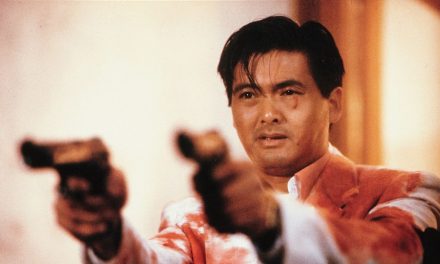A new music biopic hits the big screen this weekend, and this time, “The Boss” gets his moment to shine with the release of Springsteen: Deliver Me from Nowhere, starring Jeremy Allen White as Bruce Springsteen. Music biopics have long been a staple of cinema, and sometimes they can lead to Oscar gold, something the creatives behind this film are hoping will happen for their trip down music memory lane. Time will tell if Springteen’s story will become one of the best to hit the big screen, but until then, we’re looking back at the five best music biopics ever to dive into before checking out this latest entry into the bunch.
Honorable Mention: Better Man (2024)
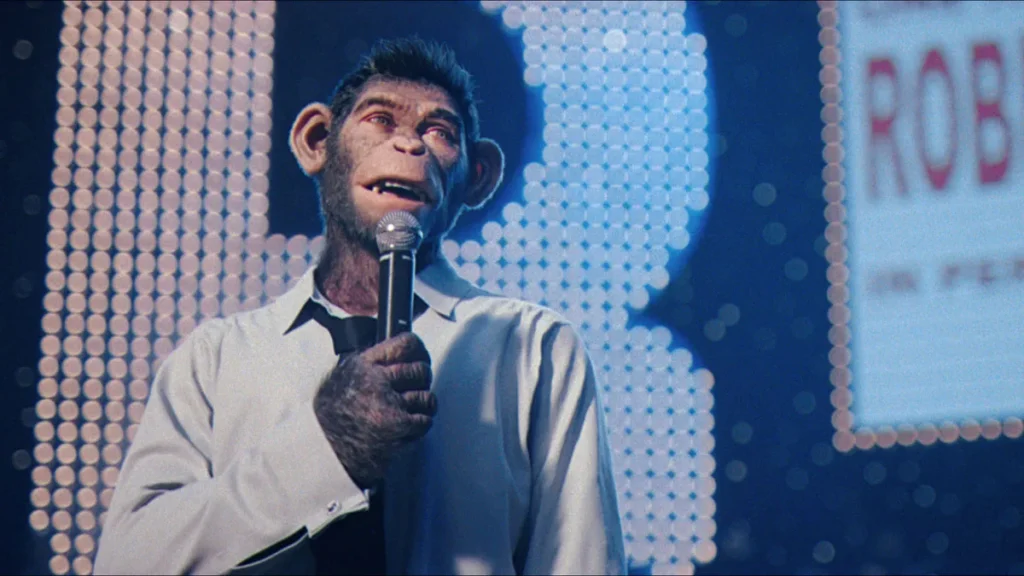
This one might be too recent to be included, but Better Man gets automatic points for creativity in terms of presenting its subject in a way that no one would expect. Directed by Michael Gracey from a screenplay he co-wrote with Simon Gleeson and Oliver Cole, Better Man is a biographical jukebox musical about English singer Robbie Williams that depicts him as a motion-capture monkey. This was reportedly done because Williams perceived himself as a “performing monkey” as he rose to fame as a member of the boy band Take That before embarking on a very successful solo career in the U.K. Through Williams providing the voice and Jonno Davies doing some impressive motion-capture work, Better Man is a surprisingly poignant look at a man and his struggles with fame.
The biggest compliment that can be given to what Gracey does as a filmmaker is that he never lets the technical aspects of it all become a gimmick, and it never loses a bit of its humanity when necessary. It also has some incredibly rendered sequences and musical numbers, with the showstopper being a celebration performance of “Rock DJ” through Regent Street that’s worth watching the film all on its own. Better Man received stellar reviews, but it was considered a box office bomb, grossing just $22.5 million globally on a $110 million budget. But if any film had cult classic written on it, it’s this one, so time will likely be very kind to Better Man as more people discover it.
5. Walk the Line (2005)
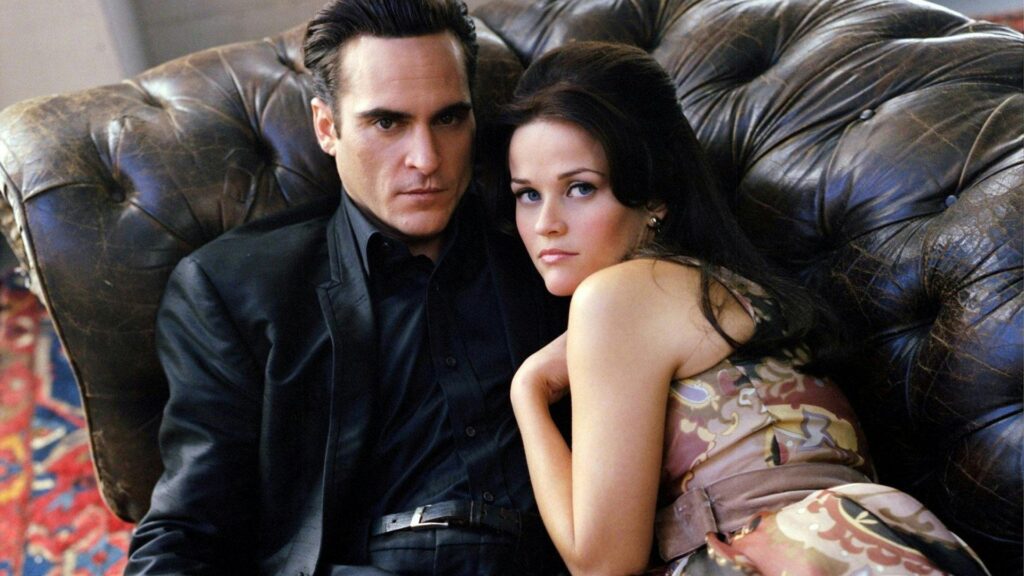
Director James Mangold fully solidified what most audiences think about when it comes to music biopics when he helmed Walk the Line, a film chronicling the life and career of Johnny Cash (Joaquin Phoenix) and his romance with singer June Carter (Reese Witherspoon). Co-written by Mangold and Gil Dennis, the film is based on two biographies about Cash (Johnny Cash: Man in Black: His Own Story in His Own Words and Cash: The Autobiography) and it follows most of the familair beats of the music biopic (childhood traumas, success in music, drug addiction, creative downfall, and finally, good old fashioned redemption) but Mangold manages to make familair territory still feel like emotionally resonant because of he has a strong handle on the material.
He’s aware that most of these real-life stories have been told before through other artists, but he also knows the importance of presentation, and his painting of Cash and Carter is much stronger than other films that have driven down these roads before. Providing him the support to make this happen are Phoenix and Witherspoon, who have electric chemistry as the musical couple and embody their passion and turmoil as they navigate through the highest of highs and some truly tumultuous moments. They prove that Cash and Carter had fire together, and they bring that to life without missing a single beat. Walk the Line was a huge success, grossing $187 million worldwide on a $28 million budget, and it even went on to be an awards season player, winning Witherspoon the Oscar for Best Actress while Phoenix nabbed a Best Actor nomination.
Walk the Line was so good that it no doubt became the main source of satirical laughs for Walk Hard: The Dewey Cox Story, but that’s what happens when your film is viewed as one of the blueprints for how these kinds of films are made.
4. Straight Outta Compton (2015)
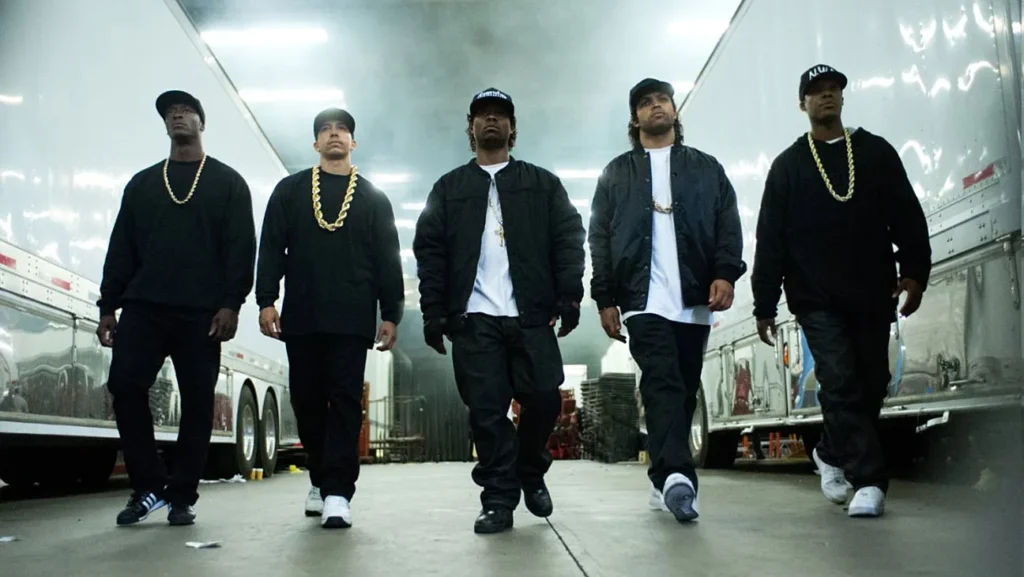
Straight Outta Compton shows the importance of having the remaining primary members of the subject of the music biopic involved with every aspect of the production. Members of N.W.A., Dr. Dre and Ice Cube, alongside Tomica Woods-Wright, the wife of the late Eric “Eazy-E” Wright (abeit for just 12 days before his death), served as executive producers on the F. Gary Gray-directed film that tells the story of the rise and fall of one of the most prolific hip-hop groups, primarily under their manager Jerry Heller (Paul Giamatti).
N.W.A.’s story provides a lot of ground to cover, including struggles within the group as well as their profound impact on hip-hop during its rise in the ’80s, which also saw a lot of pushback because of their lyrical content that the mainstream believed promoted and incited gang violence. It’s a testament to Gray that he covers these beats in a meaningful manner that doesn’t feel shortchanged and allows viewers who may have been unfamiliar with the group to learn that they were more than what they were being painted as in the media.
Proving to be a major asset is the cast itself, including O’Shea Jackson Jr. (portraying his father O’Shea “Ice Cube” Jackson Sr., Corey Hawkins, Jason Mitchell, Neil Brown Jr., and Aldis Hodge, who spent eight weeks training to portray the group while also re-recording their debut album so they could learn every nuance of the people they were portraying.
Straight Outta Compton was a financial success ($201.6 million worldwide on a $50 million budget), and it was nominated for an Academy Award for Best Original Screenplay. The film arguably deserved more during its respective awards season because it’s an impressive piece of work, depicting a moment in time when the world wasn’t quite ready for a group like N.W.A.
3. Selena (1997)

Selana Quintanilla-Perez was tragically murdered in 1995 by her fan club president, Yolanda Saldivar, so the turnaround between her death in March 1995 and the release of her biopic in March 1997, was fairly quick but likely necessary for the family to tell her story to the masses so it wasn’t tainted by her murder for those who weren’t familair with the popular Tejano Music. While Selena was on the verge of breaking out in the English-language space before her death, she was known as the “Mexican Madonna” and the “Queen of Tejano Music” thanks to her contributions as a member of Selena y Los Dinos before going solo in the Tejano music market.
I say all this to say that, without the film written and directed by Gregory Nava, Selena’s life story may not have reached those who didn’t know about her before her tragic death, and the film serves the ultimate purpose of showcasing why she was so beloved by her family, friends, and legions of fans. One of the bravest things the movie does is not make the tragedy of her death a salacious highlight. The movie builds to her tragic conclusion, but it’s not the primary focus. Selena is more of a family drama mixed with a music biopic as a Mexican-American family tries to instill values and traditions while also centering the meteoric rise of one of their own.
The movie was a huge breakout moment for Jennifer Lopez, who disappears into the Tejano music star. Lopez is electric during the film’s musical performances, but it’s Selena’s warmth that she captures the most, which, at least for the runtime of this film, brings her back to life in a meaningful way for all those who loved her.
2. Rocketman (2019)

If anyone’s life deserved to be a jukebox musical film, it’s the life of Elton John, and that’s exactly what he received with 2019’s Rocketman, directed by Dexter Fletcher. Working from a screenplay by Lee Hall, Rocketman focuses on John’s early days in England all the way through his partnership with Bernie Taupin (Jamie Bell), with tales of his crippling addictions along the way. Rocketman uses John’s music to tell its story, and Fletcher’s directorial eye serves to make his life completely fantastical, which just feels right and suits John’s legendary and flamboyant performance style that has captivated his fans for years.
What makes Rocketman work as a music biopic is that it does travel done the typical trajectory of one and messes with reality a bit to give its subject a more larger-than-life persona. It’s also framed as a movie musical, which gives John’s already stellar songs so much more weight as they’re given the full cinematic experience through some truly stellar performances. It has baffled me since the movie was released that it didn’t get much love from the Academy Awards, save a nomination for Best Original Song. While I firmly believe the movie deserved more love, it’s Taron Egerton as the singer himself that remains one of my biggest snubs for a nomination.
He does all of his own singing in the movie (something a certain other actor didn’t do in another music biopic that landed him a Best Actor Academy Award), and he completely disappears into John’s eccentric personality, conveying his love for music while also showcasing the downward spiral of the addictions that nearly destroyed him. Rocketman is how you do a music biopic that honors the subject’s unique sensibilities while also making it something that is far from by the numbers.
1. What’s Love Got to Do With It (1993)
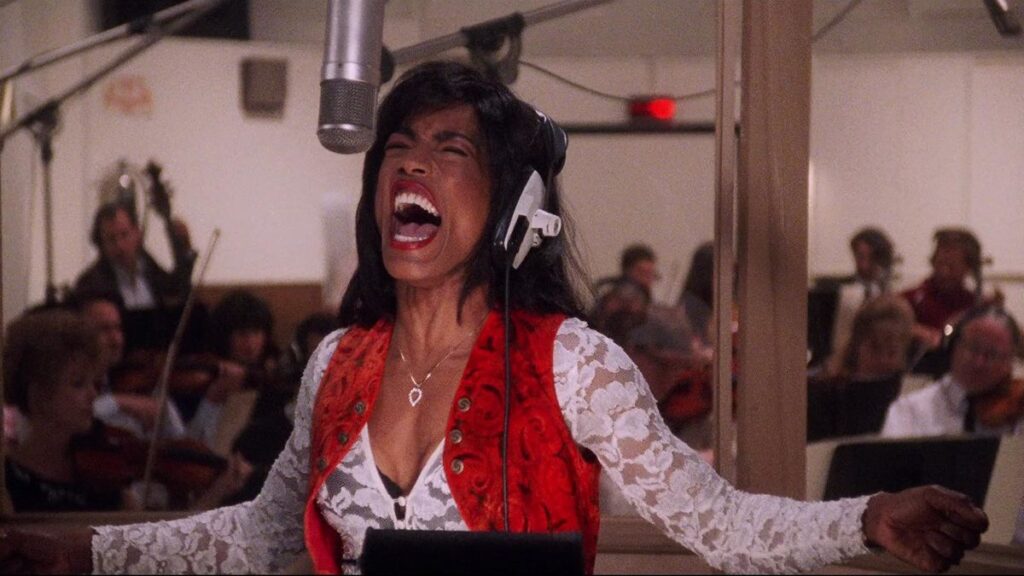
What’s Love Got To Do With It presents a biopic that does showcase the massive highs of its subject matter, but it’s the film’s depiction of the toxic, irreprehensible lows that gives the movie an emotional impact that is hard to shake once you’ve seen it. Directed by Brian Gibson from a screenplay by Kate Lanier, What’s Love Got to Do With It is based on the autobiography, I, Tina, and details the life of singer-songwriter Tina Turner (Angela Bassett).
The film tracks her beginnings and then her rise under her mentor and husband, Ike Turner (Laurence Fishburne), who also turned her life into a living hell as her abuser. What’s Love Got To Do With It is equal parts music biopic and story of survival as Tina has to eventually find the strength to escape the abusive trappings of her relationship and find the ability to live life on her terms.
Ike frequently convinced Tina that she wouldn’t be successful without him and wouldn’t be much of anything on her own, so watching the film build to Tina’s moment of “I’m not going to take this anymore,” makes for a compelling watch. Bassett and Fishburne are at their very best here, and be warned, the scenes of abuse are brutally depicted with both performers being one hundred percent committed to displaying just how violent and painful Tina’s life was under Ike’s abuse.
Bassett conveys Turner’s fiery performance style while also showcasing her tenacity and strength once she breaks free of the shackles of years of abuse. Fishburne also deserves credit for his charismatic but toxic betrayal of Ike, a role that likely wasn’t easy for him to play but one he dives into with unwavering honesty, no matter how ugly it looks. Both actors were Oscar-nominated for their roles (there’s a big argument that at least Bassett deserved to win), and the film has endured as a testament to its subject matter. It’s also a highlight to see the late Tina Turner make a real appearance at the end of the film to truly establish that she overcame her struggles to build a successful life and career, not defined by a man who consistently tried to break her down.
Springsteen: Deliver Me from Nowhere hits screens nationwide this Friday.


![‘The Invitation’ Is An Average Vampire Flick That Doesn’t Live Up To Its Inspirations [Review]](http://18.211.146.234/wp-content/uploads/2022/08/project_20220826_1029318-01-440x264.png)
![Interview With Diamond Select Toys & Gentle Giant Ltd. Marketing Supervisor Zach Oat [NYCC 2021]](http://18.211.146.234/wp-content/uploads/2021/10/DST-interview-440x264.jpg)

